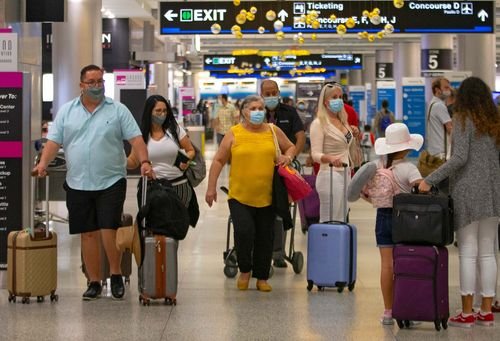Masks are critical to stopping coronavirus spread, even at home, CDC says

Masks are “critical” to controlling the spread of coronavirus, and that includes at home sometimes, the US Centers for Disease Control and Prevention said Friday.
A CDC review of what works makes it clear that mask use, physical distancing, avoiding crowds and washing hands all could help control the spread of the virus — and would allow kids to go back to school and businesses to reopen.
“Consistent and correct use of face masks is a public health strategy critical to reducing respiratory transmission of SARS-CoV-2, particularly in light of estimates that approximately one half of new infections are transmitted by persons who have no symptoms,” the CDC summary of guidance reads.
The CDC has gradually been strengthening its recommendations on mask use. “Compelling evidence now supports the benefits of cloth face masks for both source control (to protect others) and, to a lesser extent, protection of the wearer,” the CDC’s Margaret Honein, Dr. Henry Walke and colleagues wrote.
Masks work so well that certain communities should consider giving them out, the CDC team said.
“A community-level plan for distribution of face masks to specific populations, such as those who might experience barriers to access, should be developed,” the CDC team wrote in the agency’s weekly report.
“Because the highest risk for transmission has been documented among household contacts of Covid-19 patients, keeping the household safe requires physical distancing, using the other public health strategies summarized here, and, in particular, consistent and correct use of face masks (outside the household and in some circumstances within the household) to prevent introduction and transmission of SARS-CoV-2,” they added.
“To preserve the supply of N95 respirators for health care workers and other medical first responders, CDC recommends nonvalved, multilayer cloth masks or nonmedical disposable masks for community use,” the team added.
“Within households, face masks should be used when a member of the household is infected or has had recent potential Covid-19 exposure.”
Physical distancing is also important.
“Although the impact of physical distancing is difficult to disaggregate from other interventions, one study estimated that physical distancing decreased the average number of daily contacts by as much as 74%,” they added. Consistent physical distancing could stop the spread, the CDC said.
Restaurants and crowded events are especially risky, the CDC team noted.
“Exposures at nonessential indoor settings and crowded outdoor settings pose a preventable risk to all participants,” they wrote.
“Indoor venues, where distancing is not maintained and consistent use of face masks is not possible (e.g., restaurant dining), have been identified as particularly high-risk scenarios. Crowded events in outdoor settings have also been linked to spread of SARS-CoV-2, although it can be difficult to isolate the impact of crowded outdoor events from related indoor social interactions.”
Since 40% or more of all people with coronavirus infections don’t have symptoms, symptom screening — like temperature checks — don’t do much good, the team noted.
Plus, testing is not always foolproof because of the possibility of false negatives. So people need to do everything: wear masks, stay apart, ventilate indoor spaces as much as possible and wash hands frequently.
Testing is, however, important. That’s especially true for people who interact a lot with others and are at higher risk, the CDC team said. That includes people who work in dense settings or college students.
Nursing home staff, for instance, should be frequently tested both for their own sakes and so they don’t spread virus to others.
And people need to get the results back quickly so they can isolate if they are infected — and warn their contacts so they don’t spread the virus without knowing it.
“These actions will provide a bridge to a future with wide availability and high community coverage of effective vaccines, when safe return to more everyday activities in a range of settings will be possible,” the CDC team wrote.




